Karin Prien, the Minister of Education of Schleswig-Holstein since June 2017, has been serving as the Deputy Chair of the Federal CDU since January 2022. In a recent interview with WELT, she praised CDU candidate Mario Voigt for his performance in a TV duel with the far-right AfD candidate Björn Höcke ahead of the Thuringian state election. Prien commended Voigt for bravely confronting Höcke and exposing his weaknesses, providing voters with a better alternative for the position of Minister President in Thuringia.
Reflecting on the reactions to the TV duel, Prien acknowledged that both the AfD and the Union felt validated by the performance of their respective candidates. Despite this, she emphasized the importance of breaking through the political deadlock in Thuringia, where the AfD remains strong and the Left Party is perceived as lacking appeal in the middle-ground. Prien stressed the need to show voters a bürgerliche Alternative, which Voigt successfully achieved through his performance in the debate.
When asked about the possibility of other Union candidates, including incumbent Ministers-President, engaging in similar duels with AfD candidates, Prien stated that each candidate must make that decision individually. She highlighted the importance of engaging with the AfD’s positions and views on an intellectual level rather than demonizing them, urging other democratic parties to follow suit in order to effectively combat the AfD’s influence, especially in East Germany.
In light of the strong voter support for the AfD and the Bündnis Sahra Wagenknecht (BSW) in the upcoming elections in the eastern states, Prien emphasized the need for the CDU to demonstrate superior offers and solutions to secure the majority. She reaffirmed the CDU’s commitment to not cooperating with the Left Party and the AfD, while cautioning against aligning with the BSW due to its problematic stances on the Ukraine conflict and NATO.
Regarding the CDU’s upcoming reorganization and the development of a new basic program, Prien highlighted the importance of focusing on maintaining economic prosperity, ensuring security, and addressing the challenges of migration. She dismissed criticisms of the proposed themes such as a potential resurgence of nuclear power and discussions around a German Leitkultur, emphasizing the current relevance of these issues in the context of societal cohesion.
In terms of leadership within the Union, Prien addressed the predominantly Western background of key figures and defended the diverse perspectives within the party, including those of leaders from Eastern states. She expressed confidence in the leadership abilities of figures like Friedrich Merz and regional leaders like Michael Kretschmer, while acknowledging the importance of regional insights in shaping the party’s direction.
Lastly, when asked about the growing use of social media by politicians to engage with the public, Prien recognized the significance of these platforms in shaping political discourse. She highlighted the increasing professionalization of extremist parties in utilizing social media and stressed the need for democratic parties to catch up in effectively utilizing these channels. Despite her concern over the decline of traditional print media, Prien emphasized the importance of adapting to changing communication trends to reach a wider audience effectively.


